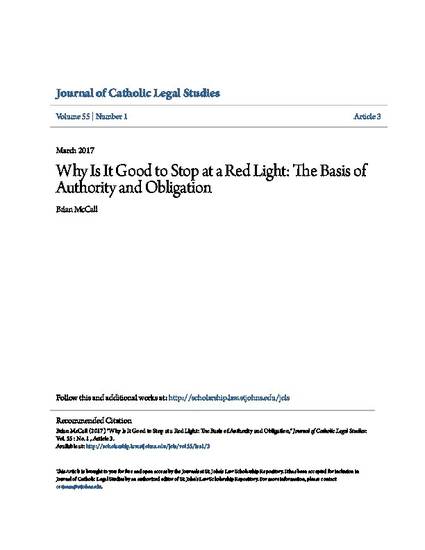
Article
Why Is It Good to Stop at a Red Light_ The Basis of Authority and Obligation
Journal of Catholic Legal Studies
(2016)
Abstract
Throughout history, some have questioned whether the authority exercised by some over others is consistent with human nature. Is it possible for a law made by one human being to bind the conscience of another, or is such a claim merely tyranny? If such a power to bind to laws made by humans is justified, what is its scope? The answers to these related questions explored in this Article are both descriptive and normative. This Article explains the nature of authority and the extent of the obligation to obey the law as well as explains how the architecture of natural law jurisprudence explains and justifies both the authority and the obligation. To introduce the subject, this Article begins by offering a preliminary definition of authority and obligation. Part I then surveys some of the competing theories of authority and obligation and demonstrates their lack of an ontology and a satisfying justification. Part II presents the classical justification for legal authority and obligation.
Keywords
- classical,
- natural law,
- authority,
- obligation,
- consent,
- utilitarianism
Disciplines
Publication Date
2016
Publisher Statement
Brian McCall (2017) "Why Is It Good to Stop at a Red Light: The Basis of Authority and Obligation," Journal of Catholic Legal Studies: Vol. 55 : No. 1 , Article 3.
Available at: http://scholarship.law.stjohns.edu/jcls/vol55/iss1/3
Citation Information
Brian M McCall. "Why Is It Good to Stop at a Red Light_ The Basis of Authority and Obligation" Journal of Catholic Legal Studies Vol. 55 Iss. 1 (2016) p. 83 - 139 Available at: http://works.bepress.com/brian_mccall/40/
